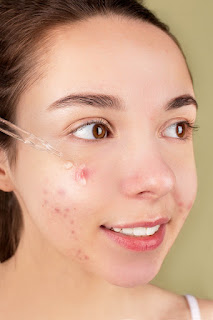Why is
skin bleaching common in Africa? Is it just some inferiority complex, or are we
missing something? Let’s find out.
A few
years ago, when I worked at a community pharmacy, a pretty lady walked into the
Pharmacy to sell this soap to us. I told her that I don’t call the shot when it
comes to procurement and, as such, could not place an order. She understood,
but instead of not making any sales, she suggested that I buy for my personal
use.
I am
usually not a cosmetic person (aside from perfumes), but the fragrance of the
soap was very appealing. The scent was similar to Extract (a soap I once used)
and was cheaper. Relying on a few pharmaco-economic analyses, buying this new
soap seemed like a good option, so I went for it.
However,
on a closer look, I saw that this new soap had "whitening soap"
boldly written on it. I queried further, and I was convinced by the lady that
it was just branding and that they didn’t have the capabilities to bleach. She
told me that most soaps have the whitening inscription attached to them (even
when they don’t have any capabilities to do such). The idea, according to her,
was to drive more sales.
To
prove her point, she took me to our cosmetic shelf, and lo, I just discovered
that most soaps had ‘whitening soap’ boldly printed on the package, even the
Extract I once used. Apparently, I didn’t even notice, and truly the Extract
soap didn’t do as much as make my palms whiter when I used it.
The
main question now is why do soap companies in Nigeria (and Africa) have to
brand their soaps in such a way to drive sales? Are we so concerned with
bleaching that we need to be deceived by such branding? Perhaps yes, because
all that is involved in skin bleaching always comes with a promise to bring out
your ‘inner color,’ as if there are some hidden colors or complexion in people.
What
will happen if you bleach your skin?
Well,
many things can happen if you bleach your skin, but irrespective of the
aesthetic result you want, the truth remains that bleaching your skin does not
add value to your body or health. Most of the time, you may just be trying to
impress people whose opinions won’t count in your journey to a healthy life.
If you
feel inferior because of your complexion or you have body positivity issues,
then visiting a counselor should be your first step instead of patronizing
Instagram vendors who sell one concoction or the other. In cases like this, you
don’t need to bleach your skin; you probably need that therapy first. A qualified
therapist may guide you through body positivity measures, which can save you
from unwarranted health hazards.
 |
| Love your body and yourself. |
That
said, here are a few things you need to know about bleaching your skin:
What
is skin bleaching?
According
to Healthline, Skin
bleaching "refers to using products to lighten dark areas of the skin or achieve
an overall lighter complexion." Some products used here are bleaching creams,
soaps, pills, and professional treatments like chemical peels and laser
therapy.
From a
medical point of view, skin bleaching offers no importance, and there is no
need to lighten the skin.
In
fact, very useful evidence suggests that skin bleaching can easily predispose
one to certain harmful effects, including skin cancer and kidney failure.
How is
skin bleaching done?
Skin
bleaching reduces the concentration or production of melanin in the skin.
Melanin is a pigment produced by cells called melanocytes.
The
amount of melanin in your skin is determined by genetics. What it means is that
you don’t have the willpower to choose the amount you come to life with, as you
basically inherit such from your parents. People with dark skin (mainly of
African descent) have more melanin.
Applying
skin bleaching products to the skin decreases the number of melanocytes in your
skin. When this is done, it ultimately results in lighter skin.
Skin
bleaching side effects
Several
countries have banned the use of skin-bleaching products because of the dangers
associated with them. Based on a review of evidence, the products were deemed
unsafe for human use. Skin bleaching has been associated with many adverse
health effects, some of which include;
1.
Mercury poisoning
Some
skin-bleaching creams have been linked to mercury toxicity. Mercury is a
component of some of these bleaching products.
Signs
and symptoms of mercury poisoning include:
- Numbness
- high blood pressure
- fatigue
- sensitivity to light
- Neurologic symptoms, such as
tremors, memory loss, and irritability
- kidney failure
2.
Dermatitis
Dermatitis
is the inflammation of the skin caused by contact with certain irritants.
Symptoms
include;
- skin redness
- blisters
- skin ulcers
- hives
- dry, scaly skin
- swelling
- itching
- burning and tenderness
3.
Exogenous ochronosis.
Exogenous ochronosis (EO) is a skin disorder that causes blue-black pigmentation. It
usually occurs as a complication of long-term use of skin-bleaching creams that
contain hydroquinone. People
who use it on large areas of the body or the entire body are more likely to
develop EO.
4.
Steroid acne
Skin
bleaching creams that contain corticosteroids can
cause steroid acne. Steroid acne mostly affects the chest but can also show up
on the back, arms, and other parts of the body.
Symptoms
can include:
- Whiteheads and blackheads
- small red bumps
- large, painful red lumps
- acne scars
5.
Nephrotic syndrome
Nephrotic
syndrome is a kidney disorder often caused by damage to the blood vessels in
your kidneys responsible for filtering waste and excess water. It causes the
body to excrete too much protein in the urine. Skin lightening creams
containing mercury have been associated with nephrotic syndrome.
Symptoms
can include:
- swelling (edema) around the eyes
- swollen feet and ankles
- foamy urine
- loss of appetite
- fatigue
IS BLEACHING YOUR SKIN BAD?
Answering
whether skin bleaching is good or bad can be very relative. A better way to
answer whether skin bleaching is bad is to say that it is often unhealthy for
most people. Worthy of note is that irrespective of the lack of specific health
benefits to skin bleaching, it can have some desirable cosmetic effects on the
skin when used to treat certain skin conditions.
Some
dermatologists can use skin bleaching treatments to reduce dark spots on the
skin caused by sun damage, aging, and hormonal changes.
 |
| Scenarios where skin bleaching products are used |
Some
skin bleaching treatments may help fade acne scars. They won’t help with active
inflammation and redness caused by a breakout, but they may reduce red or dark
areas that linger after acne has healed.
How to
use skin bleaching products
Use
varies from product to product. Skin lightening creams are typically applied
only to dark areas of skin once or twice a day.
To use
a skin-lightening cream, follow the directions given by a doctor or on the
packaging. These directions may often involve:
- applying the product sparingly
using clean hands or a cotton pad
- avoiding contact with your
surrounding skin, eyes, nose, and mouth
- washing your hands thoroughly
after use
- avoiding touching the treated
area against another person’s skin
- applying sunscreen to prevent
skin damage from UV exposure
Many
skin-lightening pills are available on the market are taken once daily, though
there is no evidence that these are effective.
Precautions
Most
skin-lightening products are not recommended for darker skin tones and could
cause hyperpigmentation. Skin-lightening treatments are also not recommended
for use by children or people who are pregnant or nursing.
Injectable
skin-lightening products are available, but they are largely not recommended.
There is insufficient evidence that they work, and there may be health risks.
Home
Remedies
Home
remedies for hyperpigmentation, like Lemon juice and hydrogen peroxide, can
irritate the skin and eyes and cause other side effects.
As
with other skin bleaching techniques, these home remedies are recommended for
treating dark spots, not lightening naturally dark skin.
Some
of these home remedies include:
- apple cider vinegar
- green tea extract
- aloe vera
In
Summary, what do you take away from all of these?
1. Skin
bleaching is a personal choice that shouldn’t be made lightly.
2. It has
no health benefits and has been linked to several serious side effects.
3. If
you’re considering skin bleaching, see your doctor or a dermatologist about the
benefits and risks.








No comments:
Post a Comment